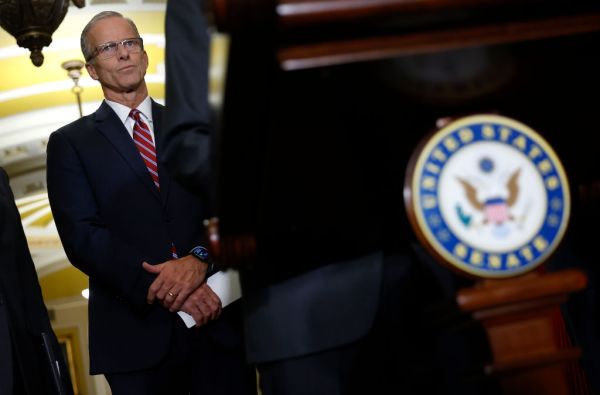George Santos would like you to know that he hasn’t done anything illegal.
He would like you to believe that, anyway.
I am not sure that it is the case that Santos, the Long Island representative-elect who seems to have lied about almost every aspect of his résumé and biography—from his education to his employment history to his being the grandson of Holocaust refugees—has not broken the law. It is the case that, as of this writing, he has not been charged with a crime, and I think it is unlikely that he will be. But consider this from the good people over at Cornell Law, who offer these criteria for fraudulent representation, which in this case falls under contract law rather than criminal law:
- a representation was made
- the representation was false
- that when made, the defendant knew that the representation was false or that the defendant made the statement recklessly without knowledge of its truth
- that the fraudulent misrepresentation was made with the intention that the plaintiff rely on it
- that the plaintiff did rely on the fraudulent misrepresentation
- that the plaintiff suffered harm as a result of the fraudulent misrepresentation
In sum this describes the Santos campaign pretty fully.
Maybe there’s an argument that the Republican Party, at least, can’t suffer harm in this case for the same reason that a serial killer has a hard time winning a defamation case: Republicans don’t have a good name to damage.
“I’m a habitual liar, but I have not been convicted of any crime”—how much of a defense is that, really?
As Jonah Goldberg and I discussed on a recent episode of The Remnant podcast, the infestation of our political life by lawyers (it is a very ancient infestation) has produced some undesirable outcomes, one of which is the elevation of legality over morality. It very well may be the case that nothing Rep.-elect Santos did was illegal—but, so what? Is there nothing wrong or evil in this world that is not legally forbidden? Five seconds of thought would be enough to reject that proposition.
“Has not been convicted of felony fraud” is a pretty low bar to clear.
We go through this from time to time, dramatically in cases of presidential impeachment. (For the longest time, there had been only the one, but now there have been four, half of them involving the same guy.) A president does something awful and embarrassing, the House reacts—provided it is controlled by the other party—and then a bunch of law-school graduates go on the talk shows and dissect, along predictably partisan lines, what constitutes an ”impeachable offense” or “high crimes and misdemeanors.” As my friend Andrew C. McCarthy often observes over at National Review, that ends up being a political question rather than a legal one: An impeachable offense is whatever the House of Representatives decides it is, and if some American objects to his representative’s take on that issue, then he has recourse at the ballot box.
I am not a constitutional scholar, and I tire quickly of talk about who is a textualist or an originalist or whatnot. For me, the question is: Why do we write the laws down? If believing that the law says what the law actually says makes you a textualist, then I suppose I am that, and if believing that history and precedent can shed some light on good-faith disputes about the interpretation of a given bit of legal language makes you an originalist, then I suppose I am that, too. But what I really am is somebody who believes that we write our laws down for a reason, because the alternative to the rule of law—which includes a judiciary engaged in a disinterested good-faith pursuit of the meaning of the law rather than the search for a pretext to impose judges’ own personal preferences—is anarcho-tyranny. (Yes, kids, I know Sam Francis, who coined that term, ended his days as a racist crank—it is a useful term and a useful concept.) Having fixed rules that we can all consult beforehand is a supremely useful innovation in human social life, and we should be grateful for it.
That being written, the idea that law should be the first or last arbiter of decent or acceptable behavior is insane. “Do whatever you like, as long as it is within the letter of the law” is a terrible, destructive, and at times positively evil credo. A morally and intellectually mature person—or even a child on his way toward such maturity—runs into a great many ethical guardrails and moral bar ditches and “Wrong Way” signs and other allegorical roadside features before he crashes into the concrete embankment of the law. The playing field of life is expansive, and there is more to what happens on it than the question of whether one is, at any given moment, out of bounds.
There isn’t any serious question about whether the Hells Angels motorcycle club is a criminal enterprise, but I’d be willing to bet that the share of elected Republicans who are active grifters and hoaxers is larger than the share of Hells Angels who are active criminals. So what does that make George Santos’ GOP?
Words About Words
Funny word, “unprecedented.” In my writing about George Santos, I have been unsparing, and—much to the predictable irritation of the usual partisan apologists for Republican moral grotesquery—I haven’t felt any particular need to rehearse the lies of other politicians. But Slate’s description of Santos’ shenanigans as “unprecedented” did rankle. The fact that other politicians have told similar lies doesn’t make Santos’ lies any better or any worse—they are precisely what they are and nothing else—but one does have to be working with some pretty massive moral blinders to describe Santos’ lies as “unprecedented” while Joe Biden is, incredibly enough, president of these United States of America. Biden, like Santos, lied about his academic background. Santos made up some Holocaust-refugee grandparents in order to cynically exploit our natural sympathy for his own personal gain; Joe Biden made up a story about his wife and infant daughter being killed by a drunk driver in order to cynically exploit our natural sympathy for his own personal gain. (Biden’s wife and daughter did die in a car wreck; there never was any indication that the driver in question was drunk—in fact, he probably wasn’t even at fault, with investigators finding that Mrs. Biden most likely had accidentally swerved into oncoming traffic.) Biden didn’t just make up details about his political career—he boosted somebody else’s life story, famously plagiarizing from a British politician.
“Unprecedented” is not a difficult word to sort out: It means “without precedent.” Sadly, that is not the case.
Some other wordiness . . .
There is a persistent belief that New York City’s nickname of “Gotham” is related to the word “Gothic,” an adjective that referred originally to the Germanic peoples who sacked Rome and, later, to the pointy and archy style of medieval architecture vaguely associated with them. The names of many Native American tribes simply mean “people,” as in the case of the Nermernuh, what the people we call “Comanche” originally called themselves. (The name “Comanche,” meaning, roughly, “enemy,” was the Ute name for the Nermernuh.) And so it was with the Goths, whose name in English comes to us through Greek and Latin from an Old Norse word meaning “men.” Gotham, on the other hand, is an Old English name meaning “goat town,” a village where the business is goat-keeping. There is an ancient comic tradition (going back to the medieval period) in which “Gotham” regularly appears as a locus of foolishness, a village of simpletons. The notion of a basically rustic and backward village of self-important fools who think of themselves as refined sophisticates was basically engineered to be repurposed for New York City, which Washington Irving did in 1807. The New York Public Library has the story here.
To the extent that “gothic” has come to be associated with darkness and moodiness as well as pointy architecture, Gotham is a gothic place.
As for the goats—ask any subway rider.
Above, I mention the “bar ditch,” which is a drainage ditch dug alongside a road, one that has the unintended extra benefit of keeping wildly out-of-control cars from veering into nearby fields and farmhouses. I’d like to think that the drivers who end up in the bar ditch are those leaving the local bar, but that isn’t where the term comes from. A bar ditch or barrow ditch is so called for unknown reasons. One possible explanation is that bar is indeed an abbreviation of barrow, and bar ditches are “crowned” with mounds of dirt, or barrows. Another theory is that barrow is a corruption of borrow, with the mounds made from dirt “borrowed” from the ditch. A third theory is that a bar ditch is a bar, or barrier, that bars cattle and other livestock from wandering into the road. “Bar ditch” is, or was, regional, with parts of Texas and New Mexico speaking more commonly of a “borrow pit,” a phrase that I have never have heard before.
Question: The little bit of road that you use to get onto a highway—what do you call that? An access road? A frontage road? A slip road? I’d like to hear from you.
Also: There are financial bubbles, and then there are financial bubbles.
Economics for English Majors
A lot of economists spend a lot of time explaining that your typical real-world human being is not Homo economicus, that economics is not meant to offer an end-all-be-all account of human behavior. But if you want to see something close to Homo economicus in action—and under stress!—keep your eyes open at the airport. Because of our excessively democratic manner, the airport is one of the few places in America where people and institutions are honest about status.
Here are a couple of recent reports that you may find illuminating: 1) Some of you may be familiar with Clear, the airport program in which you pay a fee to get expedited access to airport security—basically, you pay an annual fee to have a guy walk you to the front of the line, including in front of the TSAPre people—and the TSAPre people hate this; 2) There is, apparently, a movement afoot to have babies banned from the first-class cabin on airplanes.
Today’s lesson will be a short one: The old cliché, “You get what you pay for” is, as it turns out, absolutely true.
I use Clear (because of course I do) for the same reason I have TSAPre and use the Centurion Lounge and fly first-class when I can: I do it for your protection. Anything I can do to make flying a little less maddening takes me one baby step away from murder. And nobody needs that.
But (slightly more) seriously, of course there are going to be multiple degrees of convenience at the airport. That’s how the whole system is set up: All of the major players in the air-travel industry (TSA, the airlines, the airport authorities, Auntie Anne’s) work together to make flying as inconvenient, uncomfortable, undignified, and unpleasant as possible, and then they create opportunities for you to pay them money to take away some of those irritations. It’s a pretty bad market—hello, Southwest!—but that’s what you should expect from a combination of politically run infrastructure (try getting an airport concession without a brother-in-law on your local city council or in the state legislature), imbecilic regulation, and the other market-distorting factors that inhibit competition and make U.S. air travel the sub-Dantean poop-cyclone it is.
You may have noticed that so many people now have TSAPre that the TSAPre line is sometimes longer. Once that happens with Clear, there will be something above and beyond Clear—for those willing to pay for it.
As for the babies: There is an option for people who are willing to pay for the privilege of deciding who gets to fly in the same airplane as them—it’s called a private jet. If you can’t afford that, don’t complain about who is in first class with you—think about why you didn’t try harder in school.
(Or, you know, think about why you became a journalist.)
Elsewhere
You can buy my most recent book, Big White Ghetto, here.
You can buy my other books here.
You can see my New York Post columns here.
In Closing
Allow me to be the 11th person to recommend to you this Olivia Nuzzi writeup of the 2024 Donald Trump campaign launch. Some of it is journalism, and some of it is poetry.









Please note that we at The Dispatch hold ourselves, our work, and our commenters to a higher standard than other places on the internet. We welcome comments that foster genuine debate or discussion—including comments critical of us or our work—but responses that include ad hominem attacks on fellow Dispatch members or are intended to stoke fear and anger may be moderated.
You are currently using a limited time guest pass and do not have access to commenting. Consider subscribing to join the conversation.
With your membership, you only have the ability to comment on The Morning Dispatch articles. Consider upgrading to join the conversation everywhere.